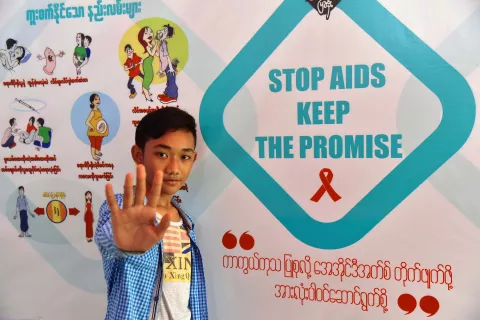Peer education saves parents and baby
Peer education saves parents and baby
- Available in:
- 中文
- English
Her children were dying, but Miya never imagined AIDS was involved. “My husband and I tried everything we could but ultimately two of our children passed away,” she says.
It was a tragic story. “My eldest daughter died just before her second birthday. Our second child did not reach her sixth month,” said Miya. “
Miya lives with her husband in a small and poor village in Southwest China. They work on a farm and always considered themselves strong and healthy. They knew about AIDS but never thought they would be affected because neither of them had been involved with injecting drugs, unlike the people they knew who were living with HIV.
Fortunately, her family finally got the help they needed thanks to UNICEF and Government support. “We never thought of AIDS,” said Miya. “It was only after a self-help group took us to do a test that we found out we are HIV-positive. Now we are on ARV treatment, and I have a healthy baby. The project saved us, my husband, our baby and me.”
When pregnant with her third child, Miya met Aling, a peer educator in the Community Care for Prevention-of Mother-to-Child Transmission (PMTCT) Project, funded by Chinese Center for Disease Control and Prevention (CDC) and UNICEF. The peer educators work in communities to encourage all mothers and prospective mothers to test for HIV and accept the free triple-treatment of specialized drugs to prevent their newborns from entering the world with HIV.
When Aling visited Miya's village, she went house to house and explained how she was benefitting from the AIDS treatment and encouraged everyone to take a free HIV test. Miya was surprised and had her preconceptions about HIV challenged - she thought Aling looked too healthy and pretty to be HIV-positive.
Following Aling's advice, Miya took the rapid test to see if she had HIV – an action which potentially saved the life of her family.
It showed she and her husband were both HIV-positive. Aling helped them follow up with the required health services at the local CDC before helping them enroll in a treatment programme.
The local CDC referred Miya to the mother and child hospital to follow up on her pregnancy and the preventive treatment for her baby. Miya received devoted support from the local self-help group through home visits and counselling on dealing with illness, family members and social assistance. She remains active in the self-help group, which also offers its members meetings on HIV-related problems, family issues, social discrimination as well as self-health care, child care, livelihood training and needed socializing.
Note: The names of the HIV/AIDS affected women are changed in this article to protect their privacy.



